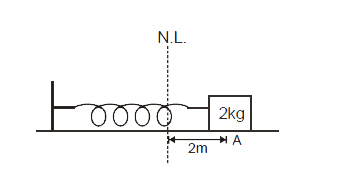In the figure shown, ma=mb=1kg block-A is neutral while block-B carries charge −1c. Sizes of A and B are negligible. Block-B is released from rest at a distance 1.8m from A. Initially spring is neither compressed nor stretched.

The amplitude of oscillation of the combined mass
23m
√1243m
√729m
√1069m
The correct Answer is:D
Figure
Similar Questions
Electrostatic force on a charged parricle is given by .F=q→E. If q is positive →F↑⏐⏐⇒→E↑⏐⏐ and if q negative →F↑⏐⏐⇒→E⏐⏐↓
Question : In the figure mA=mB=1kg. Block A is neutral while qB=−1C. Sizes of A and B are negligible. B is relased from rest at a distance 1.8 m from A. Initially spring is neither compressed nor elongated

The amplitude of oscillation of the combined mass will be :
View SolutionIn the figure mA=mB=1kg. Block A is neutral while qB=−1C. Sizes of A and B are negligible. B is released from rest at a distance 1.8 m fromt A. Initially spring is neither compressed nor elongated.

The amplitude of oscillation of the combined mass will be
View Solution
Knowledge Check
In the figure shown, ma=mb=1kg block-A is neutral while block-B carries charge −1c. Sizes of A and B are negligible. Block-B is released from rest at a distance 1.8m from A. Initially spring is neither compressed nor stretched.

Equilibrium position of the combined mass is at X=A−29mB−13mC−59mD−79mIn the figure shown, ma=mb=1kg block-A is neutral while block-B carries charge −1c. Sizes of A and B are negligible. Block-B is released from rest at a distance 1.8m from A. Initially spring is neither compressed nor stretched.

If collision between A and B is perfectly inelastic, then velocity of the combined mass just after collision isA6m/sB3m/sC9m/sD12m/sIn the figure mA=mB=1kg. Block A is neutral while qB=−1C. Sizes of A and B are negligible. B is released from rest at a distance 1.8 m fromt A. Initially spring is neither compressed nor elongated.

The amplitude of oscillation of the combined mass will beA23mB√1243mC√729mD√1069m
In the figure mA=mB=1kg. Block A is neutral while qB=−1C. Sizes of A and B are negligible. B is released from rest at a distance 1.8 m fromt A. Initially spring is neither compressed nor elongated.

Equilibrium position of the combined mass is at x = ........m.
View SolutionIn the figure mA=mB=1kg. Block A is neutral while qB=−1C. Sizes of A and B are negligible. B is released from rest at a distance 1.8 m fromt A. Initially spring is neither compressed nor elongated.

If collision between A and B is perfectly inelastic, what is velocity of combined mass just after collision ?
View SolutionThe block shown in figure is released from rest. Find out the speed of the block when the spring is compressed by 1 m

View SolutionIn the figure mA=mB=1kg. Block A is neutral while qB=−1C. Sizes of A and B are negligible. B is released from rest at a distance 1.8 m fromt A. Initially spring is neither compressed nor elongated.

Equilibrium position of the combined mass is at x = ........m.
View SolutionIn the figure mA=mB=1kg. Block A is neutral while qB=−1C. Sizes of A and B are negligible. B is released from rest at a distance 1.8 m fromt A. Initially spring is neither compressed nor elongated.

If collision between A and B is perfectly inelastic, what is velocity of combined mass just after collision ?
View Solution
